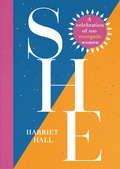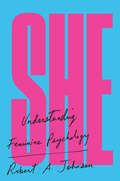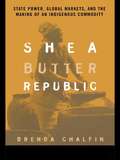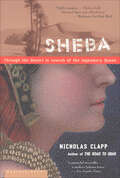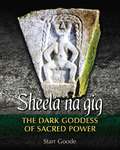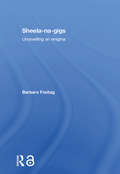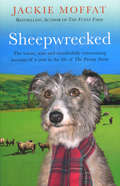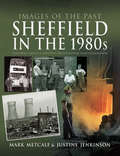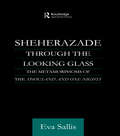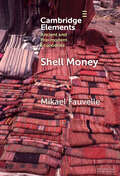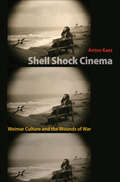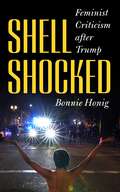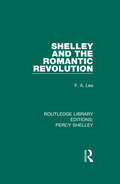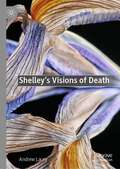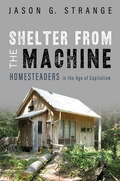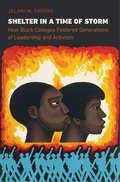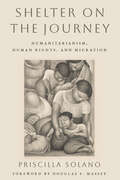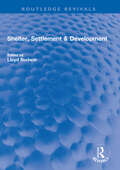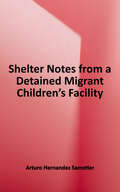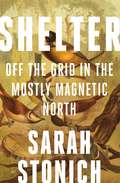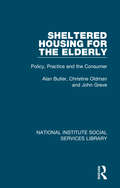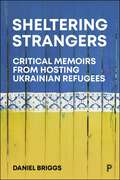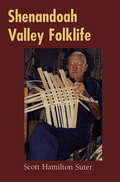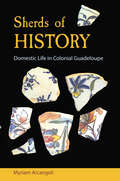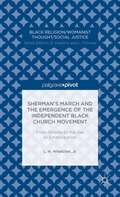- Table View
- List View
She: A Celebration of Renegade Women
by Harriet HallCALLING ALL WOMEN!She: A Celebration of Renegade Women by Stylist's Harriet Hall is the must-have book for women everywhere. Perfect for fans of Caitlin Moran, Lena Dunham and Good Night Stories For Rebel Girls. 'SHE is essential for your bookshelf' StylistSHE is a love letter to all the women who have thrown out the rulebook and threatened the status quo. It's a toast to the brave, bold and brilliant women who make us proud to be ladies.From fashion icon Coco Chanel to Queen Cleopatra, from literary legend Jane Austen to trailblazer Michelle Obama and from kick-ass activist Malala Yousafzai to the one-and-only Beyoncé, SHE honours 100 truly renegade women, from history through to present day. Gorgeously curated and expertly written by Stylist journalist Harriet Hall, and filled with stunning black and white illustrations by Alice Skinner, SHE is a thing of beauty to be worshipped, just like the women that make up its contents.This statement, timely book is the perfect gift for the renegade women in your life who inspire and amaze you or, for YOU, to simply make you proud of being a woman.
She: Understanding Feminine Psychology
by Robert A. JohnsonRobert A. Johnson's groundbreaking, brilliant, and insightful work on how women transition into being mature and developing their own identity—newly reissued.What does it mean to be a woman? What is the pathway to mature femininity? And what of the masculine components of a woman’s personality?Many scholars and writers have long considered that the ancient myth of Amor and Psyche is really the story of a woman’s task of becoming whole, complete, and individuated. Here, examining this ancient story in depth and lighting up the details, Robert A. Johnson has produced an arresting and perceptive exploration of what it means to become a woman. You will not read these pages without understanding the important women in your life and a good deal about yourself as a woman. More important than ever before, She offers a compelling study of women.
Shea Butter Republic: State Power, Global Markets, and the Making of an Indigenous Commodity
by Brenda ChalfinShea butter (butyrospermin parkii) has been produced and sold by rural West African women and circulated on the world market as a raw material for more than a century. Shea butter has been used for cooking, making soap and candles, leatherworking, dying, as a medical and beauty aid, and most significantly, as a substitute for cocoa butter in chocolate production. Now sold in exclusive shops as a high-priced cosmetic and medicinal product, it caters to the desire of cosmopolitan customers worldwide for luxury and exotic self-indulgence. This ethnographic study traces shea from a pre- to post-industrial commodity to provide a deeper understanding of emerging trends in tropical commoditization, consumption, global economic restructuring and rural livelihoods. Also inlcludes seven maps.
Sheba: Through the Desert in Search of the Legendary Queen
by Nicholas ClappThree thousand years ago, a dusky queen swept into the court of King Solomon, and from that time to the present day, her tale has been told and retold. Who was this queen? Did she really exist? In a quixotic odyssey that takes him to Ethiopia, Arabia, Israel, and even a village in France, Nicholas Clapp seeks the underlying truth behind the multifaceted myth of the queen of Sheba. It's an eventful journey. In Israel, he learns of a living queen of Sheba -- a pilgrim suffering from "Jerusalem Syndrome" -- and in Syria he tracks down the queen's tomb, as described in the Arabian Nights. Clapp investigates the Ethiopian shrine where Menelik, said to be the son of Solomon and the mysterious queen, may have hidden the Ark of the Covenant. Then the "worst train in the world" (according to the conductor) takes Clapp to the Red Sea, where he sets sail for Yemen in an ancient dhow and comes perilously close to being shipwrecked. As in his search for the lost city of Ubar, Clapp uses satellite images, this time to track an ancient caravan route that leads to the queen's winter capital in present-day Yemen. The quest is bolstered by new carbon-14 datings and by the discovery of an Arabian Stonehenge in the sands of the Rub' al-Khali. Finally, at the romantic and haunting ruins of Sirwah, the pieces of the queen of Sheba puzzle fall into place.
Sheela na gig: The Dark Goddess of Sacred Power
by Starr GoodeTraces the origins of the Sheela na gig from Medieval times to Paleolithic cave art • Reveals the sacred display of the vulva to be a universal archetype and the most enduring image of creativity throughout the world • Provides meditations on the Sheelas the author encountered in Ireland, England, Scotland, and Wales, allowing readers to commune with the power of these icons • Includes more than 150 photographs and illustrations from around the world For millennia, the human imagination has been devoted to the Goddess, so it is hardly a surprise to find images of supernatural females like Sheela na gigs adorning sacred and secular architecture throughout Ireland, England, Wales, and Scotland. Appearing on rural churches, castles, bridges, holy wells, tombs, and standing stones, these powerful images of a figure fearlessly displaying her vulva embody the power of the Dark Goddess over the mysteries of sex, life, death, and rebirth. Exploring the art and myth of the Sheela na gig from Celtic and Classical times back to Paleolithic cave art, Starr Goode shows how the Sheela embraces a conundrum of opposites: she clearly offers up her ripe sex yet emanates a repelling menace from the upper half of her hag-like body. Through more than 150 photographs, the author shows how the Sheela is a goddess with the power to renew, a folk deity used to help women survive childbirth, and, as a guardian of doorways and castle walls, a liminal entity representing the gateway to the divine. She explains how these powerful images survived eradication during the rise of Christianity and retained their preeminent positions on sacred sites, including medieval churches. The author provides meditations on the individual Sheelas she encountered during her 25 years of research, allowing readers to commune with these icons and feel the power they emanate. Exploring comparable figures such as Baubo, Medusa, the Neolithic Frog Goddess, and vulva depictions in cave art, she reveals the female sacred display to be a universal archetype, the most enduring image of creativity throughout history, and illustrates how cultures from Africa and Ecuador to India and Australia possess similar images depicting goddesses parting their thighs to reveal sacred powers. Explaining the role of the Sheela na gig in restoring the Divine Feminine, the author shows the Sheela to be an icon that makes visible the cycles of birth, death, and renewal all humans experience and a necessary antidote to centuries of suppression of the primal power of women, of nature, and of the imagination.
Sheela-na-gigs: Unravelling an Enigma
by Barbara FreitagHere Barbara Freitag examines all the literature on the subject since their discovery 160 years ago, highlighting the inconsistencies of the various interpretations in regard to origin, function and name. By considering the Sheela-na-gigs in their medieval social context, she suggests that they were folk deities with particular responsibility for assistance in childbirth. This fascinating survey sheds new light on a controversial phenomenon, and also contains a complete catalogue of all known Sheela-na-gigs, including hitherto unrecorded or unpublished figures.
Sheepwrecked
by Jackie EllisThis journey through the changing seasons at Rowfoot Farm - tupping time in the autumn, winters as wet, bleak and cold here in Cumbria as elsewhere, lambing and the glories of spring, a bucolic, bee-filled Eden Valley summer with its many shows and fairs - will reveal much that you need to know about the countryside, its quirky customs and ways, and most likely a great deal that you don't. They no longer burn witches (not because they're lily-livered, it's just that getting the necessary timber from sustainable forests is a real chore). You'll find nothing here about welly-wanging either. Jackie doesn't wang her wellies, she just gets them muddy. You won't need to, of course, as this book will ensure you experience rural life vicariously and very cleanly.Along the way, Jackie bumps into friends old and new, peeps back over her shoulder every now and then to recall times past, oh and it wouldn't be her if she didn't have the occasional impassioned rant or take the odd pop at the establishment, but rest assured she's quite gentle with them. So join Jackie (and Katie the Lurcher, Blossom the Cob and Rowfoot's many other residents, four- and two-legged) as she recounts the occasional pitfall and many pleasures of running a small farm in one of the most beautiful parts of England.
Sheffield in the 1980s (Images of the Past)
by Mark Metcalf Justine JenkinsonA visual portrait of a British city and its people fighting to survive an era of industrial decline, captured by a steelworker-turned-photographer.The social, industrial, and economic changes imposed on the Sheffield area during the 1980s are captured with remarkable clarity in this volume featuring the work of steelworker-turned-photographer Martin Jenkinson. Like many northern England and Scottish cities during that decade, Sheffield went through troubled times, even as parts of southeast England, especially the City of London, boomed. The gap between north and south became a chasm.Jenkinson photographed people in their everyday lives at work and at play. However, where he particularly excelled was his work with the trade union and labor movement, in workplaces and on protests, demonstrations, and pickets. Some of the images in this book capture joy and laughter; some portray suffering. They provide a loud cry for social justice, a better world where unemployment is no more, poverty is swept away, and everyone, black and white, male and female, can enjoy a life where their talents are used for the collective improvement of all. In reflecting on the not-so-distant past, Jenkinson’s photographs are about a world we still must aim to obtain.
Sheherazade Through the Looking Glass: The Metamorphosis of the 'Thousand and One Nights' (Routledge Studies in Middle Eastern Literatures)
by Eva SallisThe Thousand and One Nights was reborn into an alien environment in 1704, its signs being received in a radically different way from their original meanings. Works of literature change as people and cultures who read them change. This study explores the Nights with reference to this view of literature.
Shell Money: A Comparative Study (Elements in Ancient and Pre-modern Economies)
by Mikael FauvelleWhere, when, and under what circumstances did money first emerge? This Element examines this question through a comparative study of the use of shells to facilitate trade and exchange in ancient societies around the world. It argues that shell money was a form of social technology that expanded political-economic capacities by enabling long-distance trade across boundaries and between strangers. The Element examines several cases in which shells and shell beads permeated throughout daily life and became central to the economic functioning of the societies that used them. In several of these cases, it argues that shells were used in ways that meet all the standard definitions of modern money. By examining the wide range of uses of shell money in ancient economic systems around the world, this Element explores the diversity of forms that money has taken throughout human history. This title is also available as Open Access on Cambridge Core.
Shell Shock Cinema: Weimar Culture and the Wounds of War
by Anton KaesHow war trauma haunted the films of Weimar GermanyShell Shock Cinema explores how the classical German cinema of the Weimar Republic was haunted by the horrors of World War I and the the devastating effects of the nation's defeat. In this exciting new book, Anton Kaes argues that masterworks such as The Cabinet of Dr. Caligari, Nosferatu, The Nibelungen, and Metropolis, even though they do not depict battle scenes or soldiers in combat, engaged the war and registered its tragic aftermath. These films reveal a wounded nation in post-traumatic shock, reeling from a devastating defeat that it never officially acknowledged, let alone accepted.Kaes uses the term "shell shock"—coined during World War I to describe soldiers suffering from nervous breakdowns—as a metaphor for the psychological wounds that found expression in Weimar cinema. Directors like Robert Wiene, F. W. Murnau, and Fritz Lang portrayed paranoia, panic, and fear of invasion in films peopled with serial killers, mad scientists, and troubled young men. Combining original close textual analysis with extensive archival research, Kaes shows how this post-traumatic cinema of shell shock transformed extreme psychological states into visual expression; how it pushed the limits of cinematic representation with its fragmented story lines, distorted perspectives, and stark lighting; and how it helped create a modernist film language that anticipated film noir and remains incredibly influential today.A compelling contribution to the cultural history of trauma, Shell Shock Cinema exposes how German film gave expression to the loss and acute grief that lay behind Weimar's sleek façade.
Shell-Shocked: Feminist Criticism after Trump
by Bonnie HonigA biting, funny, up-to-the-minute collection of essays by a major political thinker that gets to the heart of what feminist criticism can do in the face of everyday politics.Stormy Daniels offered a #metoo moment, and Anderson Cooper missed it. Conservatives don’t believe that gender is fluid, except when they’re feminizing James Comey. “Gaslighting” is our word for male domination but a gaslight also lights the way for a woman’s survival.Across two dozen trenchant, witty reflections, Bonnie Honig offers a biting feminist account of politics since Trump. In today’s shock politics, Honig traces the continuing work of patriarchy, as powerful, mediocre men gaslight their way across the landscape of democratic institutions.But amid the plundering and patriarchy, feminist criticism finds ways to demand justice. Shell-Shocked shows how women have talked back, acted out, and built anew, exposing the practices and policies of feminization that have historically been aimed not just at women but also at racial and ethnic minorities. The task of feminist criticism—and this is what makes it particularly well-suited to this moment—is to respond to shock politics by resensitizing us to its injustices and honing the empathy needed for living with others in the world as equals. Feminist criticism’s penchant for the particular and the idiosyncratic is part of its power. It is drawn to the loose threads of psychological and collective life, not to the well-worn fabrics with which communities and nations hide their shortcomings and deflect critical scrutiny of their injustices. Taking literary models such as Homer’s Penelope and Toni Morrison’s Cee, Honig draws out the loose threads from the fabric of shock politics’ domination and begins unraveling them. Honig’s damning, funny, and razor sharp essays take on popular culture, national politics, and political theory alike as texts for resensitizing through a feminist lens. Here are insightful readings of film and television, from Gaslight to Bombshell, Unbelievable to Stranger Things, Rambo to the Kavanaugh hearings. In seeking out the details that might break the spell of shock, this groundbreaking book illustrates alternative ways of living and writing in a time of public violence, plunder, and—hopefully—democratic renewal.
Shelley and the Romantic Revolution (RLE: Percy Shelley #3)
by F.A. LeaFirst published in 1945. In this work the author seeks to correct the misinterpretation and incorrect labelling of Shelley’s thought. While not neglecting Shelley as a poet, this book focuses on his contributions made to the general movement of political and philosophical thought of his era and by so doing his relevance to contemporary issues. This title will be of interest to students of literature.
Shelley's Visions of Death
by Andrew LaceyThis book provides the first modern, in-depth analysis of Percy Bysshe Shelley’s engagement with the phenomenon of death. It argues that, for Shelley, this most nebulous of realities represents, first and foremost, possibility: Shelley’s poetic writings on death are both numerous and varied, presenting his reader, with differing degrees of confidence over the course of his brief but brilliant career, with several key visions of what death might be or actually is. Shelley’s Visions of Death stresses the seldom-appreciated fact that death was one of Shelley’s most enduring preoccupations, and also demonstrates the poet’s power to imagine, with startling variety, that which lies beyond the boundaries of experience.
Shelter from the Machine: Homesteaders in the Age of Capitalism
by Jason G. Strange”You’re either buried with your crystals or your shotgun.” That laconic comment captures the hippies-versus-hicks conflict that divides, and in some ways defines, modern-day homesteaders. It also reveals that back to-the-landers, though they may seek lives off the grid, remain connected to the most pressing questions confronting the United States today.Jason Strange shows where homesteaders fit, and don't fit, within contemporary America. Blending history with personal stories, Strange visits pig roasts and bohemian work parties to find people engaged in a lifestyle that offers challenge and fulfillment for those in search of virtues like self-employment, frugality, contact with nature, and escape from the mainstream. He also lays bare the vast differences in education and opportunity that leave some homesteaders dispossessed while charting the tensions that arise when people seek refuge from the ills of modern society—only to find themselves indelibly marked by the system they dreamed of escaping.
Shelter in a Time of Storm: How Black Colleges Fostered Generations of Leadership and Activism
by Jelani M. Favors2020 Museum of African American History Stone Book Award2020 Lillian Smith Book AwardFinalist, 2020 Pauli Murray Book PrizeFor generations, historically Black colleges and universities (HBCUs) have been essential institutions for the African American community. Their nurturing environments not only provided educational advancement but also catalyzed the Black freedom struggle, forever altering the political destiny of the United States. In this book, Jelani M. Favors offers a history of HBCUs from the 1837 founding of Cheyney State University to the present, told through the lens of how they fostered student activism.Favors chronicles the development and significance of HBCUs through stories from institutions such as Cheyney State University, Tougaloo College, Bennett College, Alabama State University, Jackson State University, Southern University, and North Carolina A&T. He demonstrates how HBCUs became a refuge during the oppression of the Jim Crow era and illustrates the central role their campus communities played during the civil rights and Black Power movements. Throughout this definitive history of how HBCUs became a vital seedbed for politicians, community leaders, reformers, and activists, Favors emphasizes what he calls an unwritten "second curriculum" at HBCUs, one that offered students a grounding in idealism, racial consciousness, and cultural nationalism.
Shelter on the Journey: Humanitarianism, Human Rights, and Migration
by Priscilla SolanoMigration journeys are arduous, with migrants tormented by risk, abuse, threats, and xenophobia. Shelters, staffed by humanitarian workers and volunteers, provide safe spaces for those in transit. Shelter on the Journey examines how these sites, often faith-based civil society associations, create solidarity and help politicize migrants, giving them a sense of themselves as an empowered, rights-holding people. Solano, who volunteered at shelters in Mexico, chronicles the activity in three of the nearly 100 shelters along a unique humanitarian trail that many Central Americans take to reach the United States. She outlines the constraints faced by these sites and their potential to create social transformation and considers how and why migration security is currently framed and managed as both a criminal and humanitarian issue. Shelter on the Journey explores the politics of the shelters, their social world, and the dynamics of charity and solidarity, as well as the need for humanitarian assistance and advocacy for dignified and free transit migration.
Shelter, Settlement & Development (Routledge Revivals)
by Lloyd RodwinFirst published in 1987, Shelter, Settlement & Development presents a comprehensive and authoritative reappraisal of shelter, settlement and development policies and programs in third world countries. Drawing on the considerable research and advisory experience of an internationally distinguished group of contributors, it introduces new ideas on many themes such as spatial strategies, land policy, shanty town settlements, infrastructure standards and construction obstacles, intricacies of housing finance and household behaviour and preferences. Each facet of the study sums up what can be inferred from past experience: what worked and what did not, and why; what ideas are in currency; what policy choices lie ahead; and most important of all, what further changes are needed to achieve feasible and effective solutions, not quick fixes, or one-shot remedies. There is a special focus on the necessary learning processes so that whatever action is taken is likely to be self-correcting in the light of subsequent experience, reflection and changing circumstances. This book is an essential read for scholars and researchers of development studies, urban studies and planning, and public policy.
Shelter: Notes From a Detained Migrant Children's Facility
by Arturo Hernandez-SametierIn this rare account from within ICE detention facilities, fourteen children are followed from their arrest by U.S. Border Patrol to the day they exit facilities for unaccompanied minors. Preschoolers and teenagers, the kids offer a range of evocative backstories: a deaf and mute fifteen-year-old Mayan girl; a teen from India who has walked three thousand miles; a Guatemalan girl who has escaped domestic slavery and is on the run with her young siblings. Each child offers an account of their chaotic journey from Guatemala, India, Honduras or Mexico, and the situation that drove them to enter the U.S. illegally. <p><p>We get an intimate view of their long, difficult quest for release to U.S. relatives and a rare, first-hand view of daily life within U.S detention shelters. The author, a therapist within a major children's detention facility, offers a vivid, and often surprising, first-hand description of daily life within our immigration shelters; the complicated, often heroic efforts of shelter workers; and the processes and politics that decide if a child is deported or allowed to join family. <p><p>In the epilogue, the author explains that due to Homeland Security restrictions, sharing information about the internal workings of migrant shelters forfeits any future employment. The author believes this to be the principal reason there are no other published accounts from within facilities for unaccompanied minors.
Shelter: Off the Grid in the Mostly Magnetic North (A Fesler-Lampert Minnesota Heritage Book)
by Sarah StonichIn her search for land to call her own—among tall pines and on a lake—newly single mom Sarah Stonich seeks a sense of permanence, a legacy for her son, and a connection to her heritage. Along this way, Stonich recalls family lore, meets remarkable characters, considers another go at love, and, finally, builds a cabin. But when her precious patch of land is threatened, she discovers that family is no less treasured with or without a piece of earth.
Sheltered Housing for the Elderly: Policy, Practice and the Consumer (National Institute Social Services Library)
by Alan Butler John Greve Christine OldmanIn the early-1980s, the ten million people of retirement age in the UK figured prominently among the disadvantaged and deprived. They were heavily over-represented in sub-standard housing and among those in most need of support from the personal social services. One form of social provision which gained rapidly in popularity in the 1960s and 1970s was sheltered housing. It was seen to combine housing with care; provided support while fostering independence; and gave scope for flexibility and experimentation in adapting schemes to local circumstances. By the late 1970s hundreds of schemes were administered, and they were occupied by half a million elderly tenants. Sheltered housing was called ‘the greatest breakthrough in the housing scene since the war’. Extravagant expectations were aroused, and sheltered housing was regarded by some as the solution to all manner of complex problems. Taking the country as a whole, however, relatively little was known about the numbers of schemes and where they were located; who owned them and how they were managed; the aims and assumptions of those who provided or advocated sheltered housing; how the schemes functioned and whether they achieved what they were set up to do; the role, experience and attitudes of wardens; what kinds of people lived in sheltered housing, their history, and how they became tenants; their assessment of the scheme; and much else. The Leeds study, on which this book is based, originally published in 1983, was the most comprehensive and detailed to have been conducted into sheltered housing. It evoked widespread interest in Britain and abroad at the time. It sought to answer some of the important questions about the growth and proliferation of sheltered housing, to evaluate sheltered housing from different points of view – including those of tenants, and to consider the scope for future development. While sheltered housing is the focal topic of the book it should be viewed in the broader context of social policy, administration, professional practice and client experience. The book describes in detail an innovatory and evolving form of social provision and, in doing so, illuminates the operation and impact of policy in action at several levels – from the policy-maker to the consumer, from the organisation of policy to its object. There was significant evidence from the study that many tenants were provided with a service which was not the one they sought, or even needed, but they were given what the agency happened to have – or made – available. Among other topics, the book examines sheltered housing as a response to, or reflection of, myths and prejudices about ageing. It discusses whether elderly people should be compelled to move from familiar surroundings late in life – and how they cope when they do move. The usefulness or otherwise of alarm systems is assessed – with conclusions that throw considerable doubt on their value or reliability. The evolution and modifications taking place in sheltered housing are reported on and the scope for future initiatives is discussed.
Sheltering Strangers: Critical Memoirs from Hosting Ukrainian Refugees
by Daniel BriggsThis book documents the intimate lives of Ukrainians as they fled their homeland in search of a safe and stable place to stay. The critical memoirs follow the lives of 16 Ukrainian families in a small Spanish town near Madrid and the local families that volunteered to host them during a time of limited state support and an absence of a clear EU plan for the refugees. Through first-hand testimonies, social media messages and photographs, the book reveals the scarring realities of the Ukrainians’ upheaval, displacement and trauma alongside the well-meaning sacrifices made by the host families which quickly mutate into moralistic and meritocratic expectations of their new guests. In doing so, the book offers a vivid portrayal of how the tensions of war and displacement play out in real life in real time.
Shenandoah Valley Folklife (Folklife in the South Series)
by Scott Hamilton SuterBordered by the Blue Ridge and the Allegheny Mountains, the Shenandoah Valley forms a natural corridor to the western parts of Virginia, Tennessee, and North Carolina. Early American settlers followed the valley as one of the first routes westward.In Shenandoah Valley Folklife, Scott Hamilton Suter documents the many peoples who have left their marks on the folkways of the region--Native Americans, Germans, Swiss, Scots-Irish, and African Americans. His research reveals how the first settlers there built homes, how they worshiped, and how they passed on legends and musical traditions that continue to play a role in the community today.Throughout the book, Suter argues that the valley's past plays a definitive role in its present. He finds family traditions still thriving in crafts like white oak basket-making, as well as in cooking and architecture. To illuminate the change and continuity in religious life, he focuses on Old Order Mennonites, the Church of the Brethren, and Baptists in the region. Using both historical sources and his own field work, Suter shows how folklife remains a powerful, resonant force in the Shenandoah, and how new immigrants are adapting and adding their own traditions to long-standing customs.
Sherds of History: Domestic Life in Colonial Guadeloupe
by Myriam ArcangeliInvestigating ceramic artifacts to better understand daily life in the French colonial Caribbean Ceramics serve as one of the best-known artifacts excavated by archaeologists. They are carefully described, classified, and dated, but rarely do scholars consider their many and varied uses. Breaking from this convention, Myriam Arcangeli examines potsherds from four colonial sites in the Antillean island of Guadeloupe to discover what these everyday items tell us about the people who used them. In the process, she reveals a wealth of information about the lives of the elite planters, the middle and lower classes, and enslaved Africans.By analyzing how the people of Guadeloupe used ceramics—whether jugs for transporting and purifying water, pots for cooking, or pearlware for eating—Arcangeli spotlights the larger social history of Creole life. What emerges is a detail rich picture of water consumption habits, changing foodways, and concepts of health. Sherds of History offers a compelling and novel study of the material record and the “ceramic culture” it represents to broaden our understanding of race, class, and gender in French-colonial societies in the Caribbean and the United States.Arcangeli’s innovative interpretation of the material record will challenge the ways archaeologists analyze ceramics.
Sherman’s March and the Emergence of the Independent Black Church Movement: From Atlanta to the Sea to Emancipation
by Jr. L. H. WhelchelA discourse on the historical emergence of African American Churches as dynamic cultural presences which occurred in the aftermath of the Civil War, and specifically in the wake of General Sherman's march from Atlanta to Savannah.
